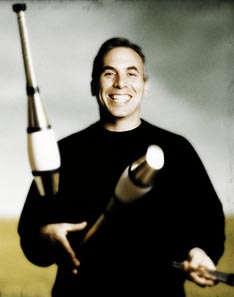 WHILE the body is going to decline with age and our joints become worse for wear, the brain is not geared towards ageing, according to American Michael Gelb, world leader in accelerated learning, speaking at the annual Mind and Its Potential conference in Sydney last month.
WHILE the body is going to decline with age and our joints become worse for wear, the brain is not geared towards ageing, according to American Michael Gelb, world leader in accelerated learning, speaking at the annual Mind and Its Potential conference in Sydney last month.
Gelb, who has had his knee and hip replaced, says: ‘‘As a sportsman I know only too well the wear and tear on joints and ligaments as time progresses.’’ But the brain, according to Gelb and other leading neuroscientists at the conference, is primed to keep growing and improving. The brain cells we lose as part of natural attrition are minor in comparison to the brain synapsis and neuro pathways we already have, and can develop when we use this vital organ properly. It’s not ‘‘Use it or lose it’’ but ‘‘Use it or it will stay dormant’’. But it’s all in there, and we can get it back, says Gelb.
The speaker before him was the pre-eminent professor Michael Merzenich, a pioneer in brain plasticity research, as quoted in Norman Doidge’s brilliant book The Brain That Changes Itself.
To paraphrase in layman’s terms the very complex studies and research he presented, older rats were tested against young rats in terms of performance, libido and memory. The results were as expected. The older rats were then given training and challenges to solve. In a short time, their memories and youthful vigour returned to the level of the younger unstimulated rats; and they lived much longer than predicted.
Gelb’s book, Brain Power, gives a few tips on how to keep the brain growing. When we trigger one area of the brain by learning, other parts can develop or switch on. Gelb suggests learning something new for 15 minutes a day. Juggling and right/left brain co-ordination are helpful to development. Oxygenating the brain is crucial to mental health thus physical exercise is in- valuable, and music can help develop neuropathways in our plastic brains. Good things to learn are languages, music, and problem-solving.
Nutrition is more important than thought in order to lubricate brain cells, and help stave off dementia; as is meditation. Cholesterol and smoking increases the chances of Alzheimer’s disease and should be avoided. Emotional connections are significant to brain growth. We are social creatures. Love, friendship and lots of play are vital to keeping us young, as is having a passion for something or someone. As we get older, we need a purpose outside of ourselves that gives life meaning.
We may be declining in many ways as time ticks on, but a healthy brain is the key to staying vital and having a fulfilling quality of life. As they say: it’s all in the mind.

No comments yet.